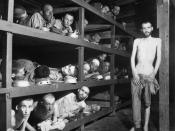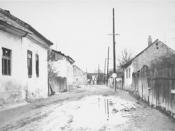"The Alienation of Eliezer"
In the book Night, by Elie Wiesel, the assumptions made at concentration camps and in ghettos about the character Eliezer reveal the moral values of the surrounding society. In the book, Jews are treated inferiorly because of their religion and have to endure many hardships. Many things are compromised, and Eliezer has to learn to survive in this new environment.
The religion of the Jews is one alienating factor. In the ghetto that Eliezer was first living in, Jews were separated from the rest of the world by barbed wire fences and security guards. In the first working environment that Eliezer is in, he mixes with civilians to do the work. The civilians are given food, but the Jews are not allowed to eat anything other than their meager meals of bread, coffee, and soup. In this environment, Jews were treated like prisoners, even though they had done nothing wrong.
This is an example of how alienation of Jews reflects on the moral values of the concentration camps and the ghettos.
The guards around the ghetto, and in the concentration camps treated the Jewish people poorly to keep control over them. When Eliezer was packed into the train with all of the other Jews, the guards would throw a lone piece of bread into the car just to watch the people kill each other over one bite of food, also, when the Jews were unloaded off of the train, they were marched right up to the crematory and then turned away quickly. The treatment of Eliezer and his companions this way reveal some moral values of the surrounding environment. Kapos of the camp would randomly beat Jews without mercy for no reason in particular. Eliezer's father was once beaten because the kapo was...


